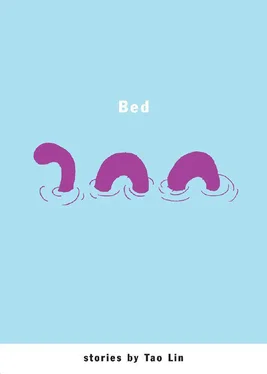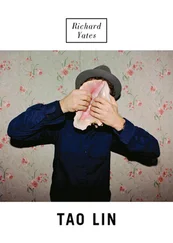Tao Lin - Bed
Здесь есть возможность читать онлайн «Tao Lin - Bed» весь текст электронной книги совершенно бесплатно (целиком полную версию без сокращений). В некоторых случаях можно слушать аудио, скачать через торрент в формате fb2 и присутствует краткое содержание. Год выпуска: 2007, Издательство: Melville House Publishing, Жанр: Современная проза, на английском языке. Описание произведения, (предисловие) а так же отзывы посетителей доступны на портале библиотеки ЛибКат.
- Название:Bed
- Автор:
- Издательство:Melville House Publishing
- Жанр:
- Год:2007
- ISBN:нет данных
- Рейтинг книги:5 / 5. Голосов: 1
-
Избранное:Добавить в избранное
- Отзывы:
-
Ваша оценка:
- 100
- 1
- 2
- 3
- 4
- 5
Bed: краткое содержание, описание и аннотация
Предлагаем к чтению аннотацию, описание, краткое содержание или предисловие (зависит от того, что написал сам автор книги «Bed»). Если вы не нашли необходимую информацию о книге — напишите в комментариях, мы постараемся отыскать её.
Bed — читать онлайн бесплатно полную книгу (весь текст) целиком
Ниже представлен текст книги, разбитый по страницам. Система сохранения места последней прочитанной страницы, позволяет с удобством читать онлайн бесплатно книгу «Bed», без необходимости каждый раз заново искать на чём Вы остановились. Поставьте закладку, и сможете в любой момент перейти на страницу, на которой закончили чтение.
Интервал:
Закладка:
“Yes it does,” Jed’s dad said. It seemed to him, then, true — it did develop in the real world, though maybe at a special store. It was 4 a.m.
“It doesn’t,” she said, a bit wanly. “This is … a weird dream.” People had their sprinklers on. The air was a bit misty, and there was a little fog.
“It’s not a dream,” Jed’s dad said. In his periphery, he could see things, vague and kind of buoyily floating about — mailboxes, garbage cans, recycling bins. It was trash night. “This is real,” he said. He looked for the moon, but saw only trees — the trees of his yard, other people’s yards; the leaves pale and spurned as freshwater shells. Something large had been flying about his face and he now slapped it blindly out of the air; against his open palm it made a tiny noise that stayed in his head, pinging there arhythmically, distortedly loud.
LJ’s mom had begun to put grass into her mouth. “I can do anything,” she said. “This is just a stupid dream.” She passed out, then woke up. She began quietly to cry. She looked up at Jed’s dad, opened her mouth, covered her mouth, crawled to a stand, and then ran away. In the morning, her car was still in Jed’s dad’s yard. The inside of the car was very clean. There was a pink bottle of perfume super-glued to the dashboard. Jed’s dad drove it back to her house and walked home. Many of the houses, he noticed, had “For Sale” signs up. Every house, it seemed. One house had been painted a deep, dark, transmogrified green. Another house looked really strange, somehow fundamentally different from all the others. A basketball was rolling down the middle of the street and a boy ran out of a house, picked it up, punted it into someone’s side yard. Jed’s dad began to run after that. As he ran, everything around his head quaked. He ran home.
School began. Jed was held back in the fourth grade, as planned. He didn’t see LJ anymore. She seemed always to be on some kind of fieldtrip. Her fifth-grade teacher encouragd his students to doodle in their textbooks, to talk to their textbooks, to talk back to their textbooks. Homework was mostly pun-orientated. One assignment, a fill-in-the-blank type thing, involved Rambo, Rimbaud, and a ram named Bo. “The world has come and gone,” LJ’s teacher said, quoting his own poetry. “Now is only what is left. A time for leaving, and for cake. The wash and foam of last things, we’ll float it out. We’ll eat fancy cake. We’ll be the wave that goes, and goes, and goes a little more, and then doesn’t go anymore.” Then he took the class on another fieldtrip.
Nationwide there was, at first, a time of increased lawmaking. Things were generally banned. There was no trust anywhere, and nothing was acceptable. A bill outlawing love was reportedly bring drafted. There was a law that, by accident, outlawed itself. Anything there was had a law for or against it. People, having paid fines for whatever infraction, went home, more inspired than outraged, and wrote their own laws, striving for originality and footnotes. “Laissez-faire,” they said stupidly. “Denouement.” Other things were said. As more things were said, people became gradually wittier. “Anarchy, apathy, and—” they said. “The three A’s.”
There was a general drift towards the arbitrary view, the solipsistic and apolitical.
Laws, then, began to be lifted. The drinking age was lowered, then gotten rid of. It became okay to break any of the smaller laws. A large region of the nation acquiesced to some ancient aphorism espousing playfulness. It was shown on TV how you might empty a package of Skittles plus all your prescription pills into a fanny pack and take one mystery pill every four to six hours. People grew amused. Cops covered their helmets and firearms — like guitars — with ironic stickers. “Mitochondria,” said the stickers. “Bernoulli’s law.” Helicopter pilots, having discovered that they could do tricks, took to the skies in waves, cityward from the suburbs, spinning, diving, circling tall buildings — enacting any scene from any movie. When a mistake in copyediting sent an oil liner to the Galapagos Islands, they left it there, crew and all, calling it innovative — a kind of achievement.
Still, it was not all fun and games. That was just the mainstream. More people, actually, were staying home, grim-faced and too well-read. More people were going to bed with a shooting sense of desperation. There were suicides in the night, feral screams from the wall-packed insides of houses. Wolves and bears and other animals, homeless and fed-up, began to use the streets, the sidewalks, the buildings — any kind of infrastructure. Families of possums moved onto front porches, chewed through to living rooms, and cut people off in their own hallways. August, September, many people simply ceased to exist, seemed to be there one day but not the next, but then there they were again, the day after, walking the dog, for an hour, after which they disappeared again, completely —murdered , some said, at last , as it was annoying, this back and forth of being there, not being there.
TV, though, was booming. It was said that there now more channels than there were people. That when you died, when you passed on , it was into TV . “TV for president,” people muttered, sincerely, at their own flat-faced, blueblazing TVs.
LJ’s mom herself no longer watched TV. She bought stuff for LJ — literature, stuffed animals, a typewriter — though LJ was rarely ever home anymore, seemed always to be at school. LJ’s mom actually was not doing too good. She had lost it a bit. She had purchased a vacuum cleaner the size of a lawnmower, the idea of which depressed her enormously. She felt constantly impending . The daily experience of things thwarted her, like some theory of quantum mechanics she just could not understand. She took to eating candy and became sallow and uninspired in the face, like a curry dish. She bought yet more things. People from far away — from TV, she felt — came daily to her front door, sold her stuff. Nights, she lay awake, waiting for morning, for the sun to come and crash her brightly along, which it would do. She sometimes thought dizzily of packing up, taking a trip, entering into TV… or some other place, any yet unsquandered world, as there must be, she felt, somewhere one could go; that if this world was ruined, if one messed up, there would be another place, sympathetic and conciliatory, to leave towards.
The first day of October, a group of her relatives flew down from Canada — six or seven grown-ups — and lived with her. She and LJ moved into the house across the street, but more relatives came, friends of relatives, and soon both houses were filled; the day before Halloween, then, they all flew back to Canada, the relatives, the friends — everyone — including, by force of association or by lack of anything else to do, LJ and her mom.
On Halloween Jed sat on the sofa feeling sorry for himself. He had made plans with LJ. They had not seen each other for a long time, and were to trick-or-treat together, and then stay overnight at Jed’s house.
Jed began, very quietly, to cry.
Jed’s dad had made squid suits for Jed and LJ — they were going to be children giant squid — and Jed, finally, put his on and fell asleep on the sofa, laid across his dad’s lap.
In the morning Jed’s lung collapsed. It was spontaneous, the nurses said, just happened sometimes — maybe because of stress — and was called pneumothorax, all of which sounded, to Jed’s dad, a little absurd, a little made up .
A week later, out of the hospital, Jed’s lung collapsed again. After that, it happened again. On the third time, they did surgery. Each time, also, they made a slit in Jed’s side, between two ribs, held down his body, and forced in a plastic tube, which was connected to a suction machine. The second time, the tube had a point at the end of it — a newer model — and they pushed it in too far, so that it almost pierced through to the other lung. After each chest-tube procedure, Jed would feel lucid, and invulnerable, almost, but also inappreciable, like something momentary and undetectable, and though he wouldn’t remember crying, his face would feel hot and wet and open-pored.
Читать дальшеИнтервал:
Закладка:
Похожие книги на «Bed»
Представляем Вашему вниманию похожие книги на «Bed» списком для выбора. Мы отобрали схожую по названию и смыслу литературу в надежде предоставить читателям больше вариантов отыскать новые, интересные, ещё непрочитанные произведения.
Обсуждение, отзывы о книге «Bed» и просто собственные мнения читателей. Оставьте ваши комментарии, напишите, что Вы думаете о произведении, его смысле или главных героях. Укажите что конкретно понравилось, а что нет, и почему Вы так считаете.












